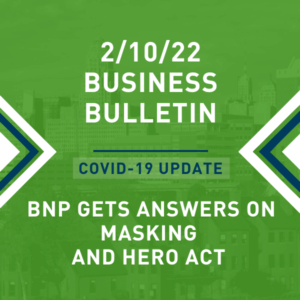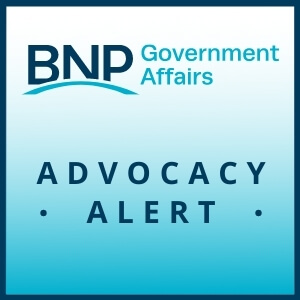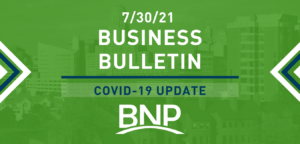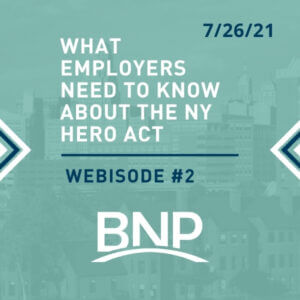9.7.21 Advocacy Alert: Hochul Triggers HERO Act – Employer Checklist
Blog Categories
September 7, 2021

What Happened?
Yesterday, Governor Kathy Hochul designated COVID-19 as a “highly contagious communicable disease,” citing rising case numbers and concerns about the delta variant. This declaration is significant because it triggers the NY HERO Act.
In June, former Governor Andrew Cuomo signed the NY HERO Act, which mandated infectious disease prevention protocols for all employers in New York. Employers must have a plan on hand, but do not need to follow these protocols unless a public health emergency is declared.
Cuomo issued an emergency declaration in March 2020, and he allowed it to expire on June 24, 2021. However, as Hochul took office, she faced pressure from lawmakers to make the declaration to trigger the HERO Act. The BNP and many others discouraged this decision.
Employer Checklist
The BNP recommends taking the following steps to comply with the NY HERO Act under this new emergency declaration:
- Utilize BNP resources (see below) to understand the NY HERO Act.
- Develop an Airborne Infectious Disease Exposure Prevention Plan for your workplace (template HERE, state standards HERE). Employers were required to adopt a plan by August 5. If you have not yet finalized yours, do so as soon as possible. The state created industry-specific templates for agriculture, construction, delivery services, domestic workers, emergency response, food service, manufacturing and industry, personal services, private education, private transportation, and retail (available at the bottom of the page here). Employers in all other industries should use the general template.
- Distribute your adopted plan to all employees. The law requires distribution of the plan within 30 days of adoption. The plan should be distributed in writing, posted at each worksite, and added to the employee handbook. Employers should also do a verbal review of the plan with employees.
- Abide by your plan throughout the duration of the emergency declaration. By following your plan and immediately correcting violations, you can keep your employees and customers safe and minimize your liability.
Disclaimer: This checklist is for informational and educational use only, and should not be considered legal advice. Legal advice is based on the specific facts of a client’s situation and must be obtained by individual consultation with a lawyer.
Where Can I Learn More?
The BNP has developed many resources to help employers understand the NY HERO Act.
We hosted two virtual episodes in which experts explained what the law means for employers. You can view the presentations and slides below:
- #1 The Basics of the HERO Act (with Barclay Damon)
- #2 Understanding and Implementing Prevention Standards (with Goldberg Segalla)
A summary of the HERO Act can be found here.
Related Posts
8.2.21 COVID-19 Bulletin: Cuomo Makes Recommendations on Vaccination Efforts
Yesterday, Governor Kathy Hochul announced she would repeal the state’s mask mandate, effective today. However, her announcement did not proactively address how the repeal coincided with the NY HERO Act, which would have required employees in most workplaces to continue masking.
8.2.21 Advocacy Alert: Senate Finalizes Bipartisan Infrastructure Details
On Sunday, senators released the text of their bipartisan infrastructure bill.
With the 2,700-page text released, all 50 Democratic senators and 18 Republican senators voted to take up debate on the bill, indicating strong bipartisan support for the measure.
7.30.21 COVID-19 Bulletin: Poloncarz Updates BNP Members on Delta Variant
At a special briefing for BNP members this morning, Erie County Executive Mark Poloncarz provided updates on the county’s COVID-19 status and indicated mask mandates could eventually return.
7.26.21 Webisode: What Employers Need to Know About the NY HERO Act – #2 Understanding & Implementing Prevention Standards
The NY HERO Act creates new workplace safety standards that every private employer in New York will have to follow. These standards govern a wide variety of topics, including health screening, masks and PPE, handwashing, surface disinfecting, social distancing, quarantines, and ventilation.




